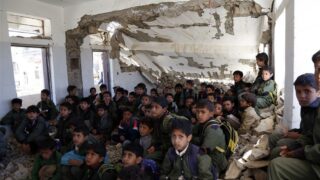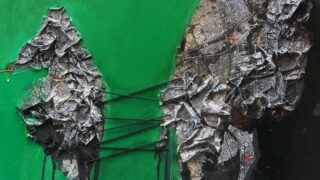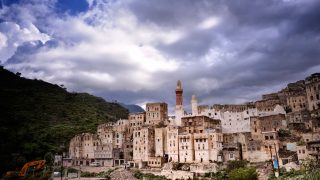Rain still dictates the mood, state of mind and psychological feelings of the residents of Yemen’s mountainous Wasab region, 200 kilometers [124 miles] south of Sanaa. This has always been the case ever since I was born there in the distant mountains — far from everything, the world and its interactions. There, it is not possible to lead a decent life without migrating.
During my latest visit, I heard the same complaints of deprivation that I had grown up hearing. Later, from the moment I was able to discern the world around me, I — like others — experienced this deprivation. I grew up lacking the most basic elements of development, whether electricity, hospitals or anything else related to the state’s responsibilities toward society.
Anthem of life
Here, rain is everything for farmers, who make up the overwhelming majority of the population (about 1 million people). The seasonal rainfall gives them hope and ensures their sustenance for the next month. People are preoccupied with their farms and cooperate with each other in agriculture. Yet they still smile, even if they are sick, waiting a long time for a paved road, and regardless of the number of women killed as they carry pots of water on their heads from distant wells back to the houses.
When it rains they sow, and during harvest they sing folk songs with rarely seen enthusiasm. For them, this is an anthem of life more than a seasonal art. Delayed rain breaks their spirits and their faces vividly express feelings of misery. Problems arise among them as they worry about their daily bread for next year, which leads to conflicts. Drought has intensified this year and the wells are almost dried up, following an unprecedented sharp decrease in water flow.
People are accustomed to gathering on the towering mountain peaks (coming in from various places to hear each other out). They collectively pray to God for it to rain down upon them, while crying and begging. When they climb up the mountains most of them carry umbrellas, since they are extremely hopeful that heaven will be generous and that they will not return to their homes until the rain pours down, despite being repeatedly disappointed. They mostly use these umbrellas as protection from the burning heat of the sun. Yet sometimes, they need their umbrellas to shield them from the rain pouring down from heaven, even if they love to feel the water drops on their heads.
Something else falling from the sky
One night in mid-April 2013, during a drought, some of the residents climbed the various mountains to implore the heavens to send rain. However, they got something other than what they were wishing for. US drones shelled one of Wasab’s areas. It was later discovered that the drones were targeting a man who is well-known by the majority of the residents of this region, Hamid al-Radmi. Two consecutive strikes rocked the second-highest mountain in Yemen, which rises 2,400 meters [7,874 feet] above sea level. Drones bombarded houses and horrified thousands of residents. Panicked, some of them rushed to the basements of their homes (typically used for livestock), while others ran away from their houses not knowing where to go, what to do, or even why. Yet they were certain that the sound they heard was not the sound of lightning foretelling the fall of rain they had hoped for, especially with the second strike that occurred within minutes of the first.
Those who did not hear the sound of the strike in the distant mountains surely saw the great light produced by missiles falling on their targets. Although the clock had yet to strike 8 p.m. that evening, most of the residents were asleep, as usual. Wasab is an area yet to be provided with electricity, and only a few people can afford small generators to provide electricity a few hours each night. Therefore, the few residents who own mobile phones leave their phones at the homes of neighbors who have generators to recharge their batteries.
Most people cope with the lack of electricity by sleeping early — as soon as the sun goes down — and by waking up in the morning at the break of dawn, just like their ancestors in bygone centuries. While they usually sleep deeply and peacefully, that night was different. They were disturbed by the sound of the deadly strike.
The strike
Recently, the Yemeni government started paving the road to Wasab, after successive unfulfilled promises made over more than three decades. So when the drone attacked, one resident close to the site of the explosion thought that the construction companies were blowing up the mountains in the evening to cut their way through them. He came out of his house shouting, swearing and cursing these companies. Only a few seconds later, he noticed three different aircraft hovering over the region: one carried out the first strike from a particular side and the second was doing surveillance while the third carried out the second strike from the other side.
The location of the strike overlooks the headquarters of the local government, its security department and a prison (there is nothing else there related to the residents’ interests). The headquarters may be reached on foot through rough lands in less than 20 minutes. Witnesses talked about the details of the strike, and how the security men in the nearby building were terrified.
One of the first to arrive to the scene following the strike talked about hearing the cries of one of the victims. The latter was trying to state his name, and pleading to be rescued and taken to a first aid unit; residents usually refrain from visiting this unit given its poor service.
However, no one could come closer, since the whole area was bursting in flames and aircraft were still hovering, as if they wanted to make sure that the victims faced the fate they had drawn out for them just minutes before. Perhaps they wanted confirm the death, a more blatant one than a death inflicted by ordinary murderers who flee once they commit the crime.
Three others who were with Radmi — the target — died in the strike. None of them knew that they would be targeted and murdered from above. None of them had anything to do with the al-Qaeda links that the Yemeni government subsequently attributed to Radmi.
One of them was a young high school graduate. His relatives said he had always dreamed of joining a military college. The second was unemployed, and he used to go with Radmi to make money, just to buy food for the day. The third was planning to travel to Saudi Arabia to provide for himself, his wife, his children and the son that his wife was expecting; the wife suddenly turned into a widow with no breadwinner to help her.
My grandfather and me
The strike targeted the road that I take every year to go to my village, on the opposite side of the Wasab mountains. My relatives and friends go there on an almost daily basis. Somewhere near the site of the strike, my grandfather had sowed the seeds of his memories and crops decades ago.
As soon as I say my full name there, the elderly welcome me and talk to me for hours about my grandfather, who I was named after. Others start whispering about how he was fascinated by women, and then affectionately ask me about “my studies in Lebanon.”
I had a strange feeling when I neared the house of Radmi. I hadn’t even heard of him until the day he was killed by the US drone, since he had only returned to his house in the mountains a few years ago. He used to live abroad and was subsequently imprisoned in the governorate center, but most people in Wasab know him, and everyone referred to him as a social figure.
I had contradictory feelings as I talked to relatives of the victims. They all asked me if when I was in the US — I gave testimony before the Senate about the use of drones in Yemen — I learned why this man and the innocent people who were with him were killed.
I felt a heavy burden on my shoulders. The father of one of them placed his wounded hand on my shoulder and asked me if they would pay them financial compensation, after my speech before the US Senate. He asked me about the “benefit” of what I say across the world about these civilian casualties. In his hand he had a picture of his son on the day of his high school graduation.
I was not widely known in Wasab — except in the vicinity of my village — but I was surprised to learn that my testimony before the Senate in Washington (which was almost two weeks before the strike against Radmi) had turned me into the talk of the town in Yemen in general, and in Wasab in particular. This would constitute a heavy burden I suffer every time I meet new people here.
I told the young victim’s father that what I do is limited to rights issues, and that I work on showing those in the West who are involved in the issue the damage inflicted by drones. I told him that I do not know what my efforts will yield or what the Yemeni and American governments can do for civilian casualties.
He was disappointed and did not seem convinced. But I didn’t have anything else I could say to this old man. I could tell by the look in his eyes that he had a thousand questions to ask, questions that incited within me a state … that befits the size of his disappointment and sadness.
In the evening, I returned to my father's house situated on the other mountain. My mother had prepared fresh milk from our cow, the fanciest thing she had to offer to me. She had also prepared some food using produce from our farm. Instead of enjoying this simple meal as I usually do, I spent all night thinking of this mess left by the person or people from thousands of kilometers away. It was as if he/they were playing Playstation. I had thousands of questions and ideas running through my head, questions as big as the mountains that surrounded me.
At dawn, I heard the steps of my mother carrying milk to me — her worried guest. I was still rolling in bed, trying to find a glimpse of hope, trying to understand what happened and what resulted from the US strike in my town. I thought about my testimony in the Senate and the echo it made in my country's media. I thought about how it did not manage to bring back any of the innocent victims of the drone strike. I thought about how lying down on the floor of my room used to give me a feeling of affection, and how it doesn’t anymore. This time, I did not feel the same feelings I used to experience every time I returned from my studies in Sanaa or the United States.
Back then, the United States had not ravaged my beloved town. Yes, the United States did give me the opportunity to study, an opportunity that made me enter the world of the 21st century. But lying on this bed today, I feel like a man coming from the caves of the seventh century. However, I do not carry a sword. All I have is a little peace to give to this town, whose farmer’s serenity gives me a sense of love for the world. This is a farmer who does not hate anyone and only holds a grudge against the sun whenever it impedes rain drops from falling on his nearby farm, failing to console him in a world suffering from a parallel drought at the level of a culture of peace and coexistence.
Translated by Al-Monitor




